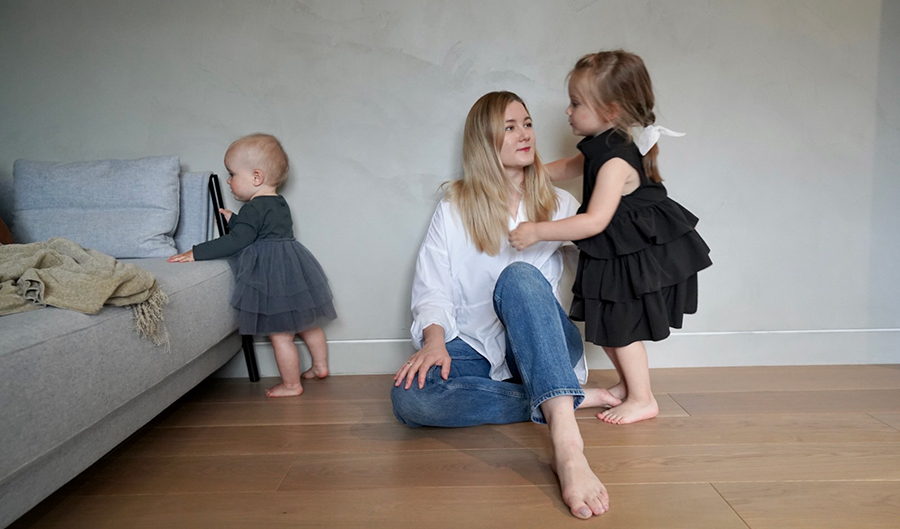Due to COVID-19, this past year has placed a tremendous burden on families and parents. We have had to deal with lockdowns, separation from loved ones, school closures and online learning, and shouldering additional responsibilities. As we mark the International Day of Families on 15 May and the Global Day of Parents on 1 June, we feature the very personal stories and coping strategies of our UN Volunteers – as partners, parents, children and more. In this article, meet Gulfam and Ksenia.
Gulfam Mustafa, UN Volunteer Partnership and Resource Mobilization Officer serving with the UN Development Programme (UNDP) in Guinea Bissau
As an international UN Volunteer, I live in a country thousands of miles away from my home. I have my family and kids back in Pakistan. Following the news of increasing COVID-19 cases causes me fear, anxiety and mental stress.
I feel concerned when I think of the health and safety of my family and kids. I have two sons and a daughter, aged 11, seven and four years old. I have travelled once to see them. In addition to difficulties caused by the pandemic, travel takes 2-3 days to reach from Bissau to Pakistan, after taking three different flights.
The other challenge is to work remotely. Due to the pandemic, I cannot go to the office regularly, which is hard. Even if I go to the office, I have fewer opportunities to interact with my peers. While living away from my family and friends in a country with difficult living conditions, the pandemic has made it challenging to establish social networks and meet new people.
On the positive side, I think the Coronavirus has helped us find innovative ways to stay connected with our loved ones. We are experiencing a digital revolution in using online modes of communication, telecommuting, sharing and even signing documents digitally. I think this is also good for nature, as there will be less paper and less carbon emissions. We have also to take better care of our hygiene, which is no longer just a good habit, rather necessary for our survival.
For those who live with their families, the COVID-19 pandemic has given them opportunities to improve relationships within the family. Parents should stay at home, set aside the time to spend with their children, help them improve self-confidence, and build stronger family bonds.
Sometimes, kids drive us crazy, but we must stay positive. We should praise our children for their creative skills. It will help them learn positive behaviours and bring new ideas. Teach your children about hygiene, safe behaviours, social distancing during the pandemic and help them manage the stress.
Ksenia Kandalintseva, UN Volunteer with the UN Refugee Agency (UNHCR) in the Russian Federation
I am a national UN volunteer in Russia, serving with UNHCR. My assignment is in public information as a UN Volunteer Communications Assistant, to raise awareness about forced displacement in Russia.
In Moscow, where I live and work, the lockdown started in March 2020. My husband and I were locked in the apartment with our two little daughters – eight months and three-and-a-half years old.
Our reality changed, our usual daily routine and schedule collapsed, but our responsibilities as parents and employees have not gone away. This was the biggest challenge last year – to work from home with literally two kids on your head. No office to concentrate, no kindergarten to play and communicate, no grandparents, who are in a risk group, to help. It is not necessary to add anything, and all the parents feel my pain.
The most positive experience we had in the Coronavirus context is that we became closer with my family, spending so much time together. And it was nice to acknowledge that we are the real team and that we don't irritate each other even when it is harsh.
The second thing I appreciate that people all around became more kind and careful with each other. The number of donations for NGOs has grown, the number of volunteers has risen, neighbours and friends started to pay more attention to one another.
And last but not least — our office and colleges managed to mobilize and transform very fast to this new coronavirus reality. Thanks to this, we have completed even more projects than planned. Professionally 2020 turned out to be successful.
"Every season has an end" — this is a quote from one of my favorite songs. I like to remember it, whether it is a difficult time or the happiest moments. The lockdown will end, the borders will open, the children will return to kindergartens, and you will no longer be able to be with them during the day. Everything is constantly changing, but our experience remains with us.
 Ksenia Kandalintseva, national UN Volunteer with the UN Refugee Agency in the Russian Federation, with her daughters. ©Ksenia Kandalintseva, personal archive
Ksenia Kandalintseva, national UN Volunteer with the UN Refugee Agency in the Russian Federation, with her daughters. ©Ksenia Kandalintseva, personal archive
